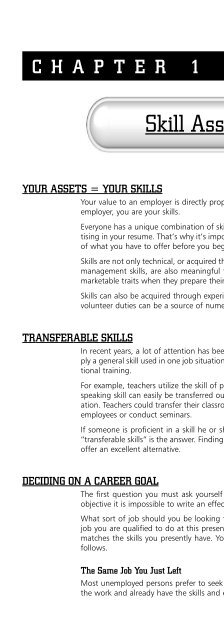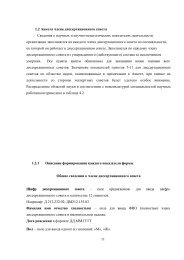worksheet
worksheet
worksheet
Create successful ePaper yourself
Turn your PDF publications into a flip-book with our unique Google optimized e-Paper software.
C H A P T E R 1<br />
Skill Assessment<br />
YOUR ASSETS = YOUR SKILLS<br />
Your value to an employer is directly proportional to the skills you have to offer. In the eyes of the<br />
employer, you are your skills.<br />
Everyone has a unique combination of skills. And, in a nutshell, that is exactly what you are advertising<br />
in your resume. That’s why it’s important to take inventory of your skills and have a clear idea<br />
of what you have to offer before you begin your resume.<br />
Skills are not only technical, or acquired through formal education. Inborn personality traits, or selfmanagement<br />
skills, are also meaningful to an employer. Yet most people tend to overlook these<br />
marketable traits when they prepare their resume.<br />
Skills can also be acquired through experience—and not only employment experience. Many times<br />
volunteer duties can be a source of numerous skills that should also be added to your inventory.<br />
TRANSFERABLE SKILLS<br />
In recent years, a lot of attention has been given to “transferable skills.” A transferable skill is simply<br />
a general skill used in one job situation that can be transferred to another job task without additional<br />
training.<br />
For example, teachers utilize the skill of public speaking when addressing a class. This same public<br />
speaking skill can easily be transferred outside a classroom setting and be utilized in another situation.<br />
Teachers could transfer their classroom skills to a business setting and apply for a job to train<br />
employees or conduct seminars.<br />
If someone is proficient in a skill he or she enjoys, yet wants a change of jobs, then focusing on<br />
“transferable skills” is the answer. Finding a job that fits your particular combination of skills would<br />
offer an excellent alternative.<br />
DECIDING ON A CAREER GOAL<br />
The first question you must ask yourself is: What job do I want? Without a specific goal or job<br />
objective it is impossible to write an effective resume or conduct an effective job search.<br />
What sort of job should you be looking for? It is important to choose a realistic job objective—a<br />
job you are qualified to do at this present time. In other words, you should be seeking a job that<br />
matches the skills you presently have. You have three choices in choosing a realistic objective, as<br />
follows.<br />
The Same Job You Just Left<br />
Most unemployed persons prefer to seek the same job they held previously. They are familiar with<br />
the work and already have the skills and experience to handle the tasks at hand.<br />
1

















